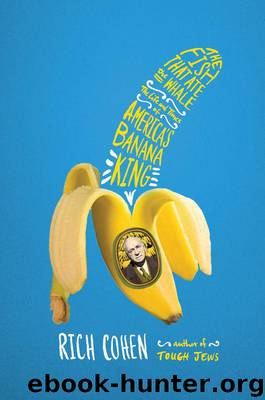The Fish That Ate the Whale: The Life and Times of America's Banana King by Rich Cohen

Author:Rich Cohen
Language: eng
Format: mobi
ISBN: 9780374299279
Publisher: Farrar, Straus and Giroux
Published: 2012-06-05T00:00:00+00:00
My mother says, “Don’t go away mad, just go away.”
Zemurray went away mad. He was not used to being slighted, condescended to, rebuffed, ignored. He spent the following weeks on the road, traveling from city to city, sitting in the offices and living rooms of shareholders. He made the same case over and over. The current management is not up to the task. Don’t believe me? Just look at the most recent quarterly report. The board must change course, follow the plan I have outlined or something similar. If allowed to continue on its current path, the value of the stock—then selling at $10 a share—will dwindle away to nothing. The company will become a relic: overgrown fields, ships sold for junk. Within five years, United Fruit will be a story of the once-upon-a-time variety.
When Zemurray spoke to the board again several months later, he had with him a bagful of proxies, the voting rights turned over to him by other stockholders. Along with his own shares, these proxies could give Zemurray control of the company, though he kept their existence a secret—for the moment, anyway. The best tycoons are like magicians; they know when to share information and when to withhold.
The meeting took place on the tenth floor of the United Fruit Building at 1 Federal Street in Boston on a January morning in 1933. It was an iconic corporate showdown of the era, remembered and discussed to this day. The outsider finds himself in a room of sneering insiders, the board of United Fruit being made up of the elite as it existed before the levees broke and the Catholics and Jews flooded in: Thomas Jefferson Coolidge, a descendant of two presidents; Channing H. Cox, the former governor of Massachusetts; Bradley Palmer, the company officer who negotiated the buyout of Cuyamel—one of the few people in the room sympathetic to Zemurray; Francis Hart, the oldest son of an original investor in Boston Fruit. A former division head, Hart had published three books on Caribbean life. He was famed for his planter’s punch. To such men, Zemurray, with his diets and love of the vernacular, was comical, offensive, crude. This meeting epitomizes the moment the establishment began to give way to the strivers.
The chairman of the board was Daniel Gould Wing, who descended from an old New England family. The president of the First National Bank of Boston, Wing looked askance at uncredentialed, ill-bred strangers who wandered in off the street. To him, Zemurray was still Sam the Banana Man, the fruit jobber from the docks. He already knew what Sam could teach him about the business: nothing.
Wing welcomed Zemurray without looking up, greeting him, as Thomas McCann characterized it, “frostily at best.” Zemurray waited as the board went through its tasks. When it was finally his turn to speak, he chose each word carefully, explaining his ideas in the thick Russian accent that he never could shed. It was the accent of neither the Russian bourgeois nor the peasant; neither the voice of Tolstoy nor the voice of Khrushchev.
Download
This site does not store any files on its server. We only index and link to content provided by other sites. Please contact the content providers to delete copyright contents if any and email us, we'll remove relevant links or contents immediately.
| Africa | Americas |
| Arctic & Antarctica | Asia |
| Australia & Oceania | Europe |
| Middle East | Russia |
| United States | World |
| Ancient Civilizations | Military |
| Historical Study & Educational Resources |
Cat's cradle by Kurt Vonnegut(15356)
Pimp by Iceberg Slim(14508)
4 3 2 1: A Novel by Paul Auster(12393)
Underground: A Human History of the Worlds Beneath Our Feet by Will Hunt(12099)
The Radium Girls by Kate Moore(12028)
Wiseguy by Nicholas Pileggi(5786)
The Fire Next Time by James Baldwin(5446)
Perfect Rhythm by Jae(5404)
American History Stories, Volume III (Yesterday's Classics) by Pratt Mara L(5308)
Paper Towns by Green John(5191)
Pale Blue Dot by Carl Sagan(5008)
A Higher Loyalty: Truth, Lies, and Leadership by James Comey(4964)
The Mayflower and the Pilgrims' New World by Nathaniel Philbrick(4504)
The Doomsday Machine by Daniel Ellsberg(4490)
Killers of the Flower Moon: The Osage Murders and the Birth of the FBI by David Grann(4447)
The Sympathizer by Viet Thanh Nguyen(4390)
Too Much and Not the Mood by Durga Chew-Bose(4348)
The Borden Murders by Sarah Miller(4325)
Sticky Fingers by Joe Hagan(4199)
